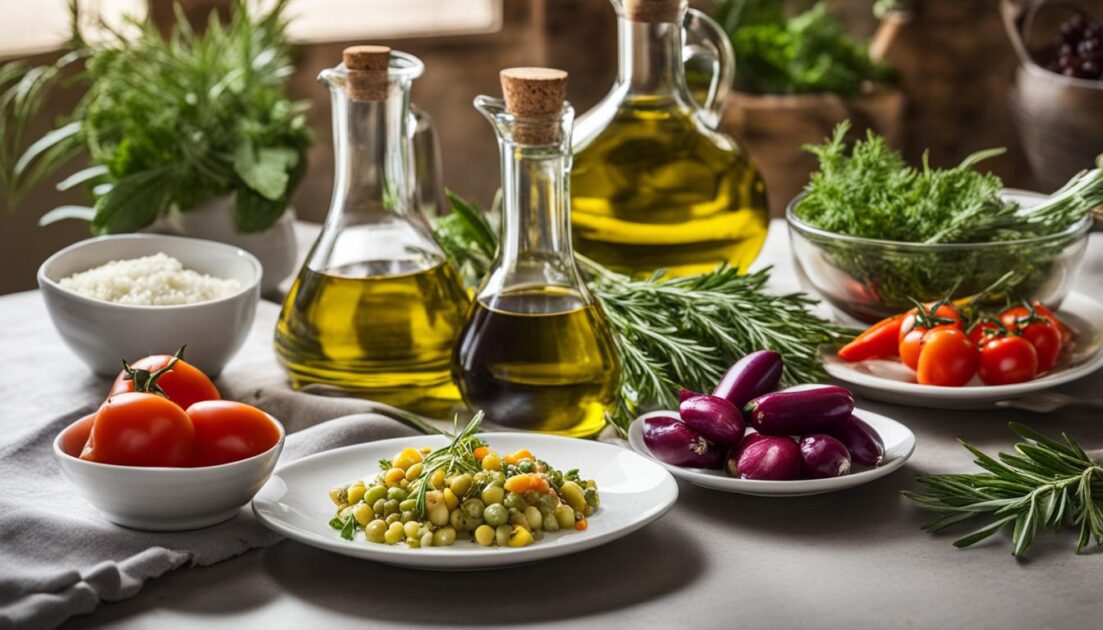Welcome to my comprehensive guide on the uses and benefits of olive oil. Olive oil, with its rich flavor and numerous health benefits, has been a staple in Mediterranean cuisine for centuries. Not only is it a versatile ingredient for cooking, but it also offers remarkable advantages for your overall well-being.
When it comes to promoting good health, olive oil truly shines. Its high content of healthy monounsaturated fats, antioxidants, and anti-inflammatory properties make it a valuable addition to your diet. Scientific research supports its positive effects on various aspects of health, including heart health, inflammation reduction, stroke prevention, and diabetes risk reduction.
Key Takeaways
- Olive oil is rich in monounsaturated fats, antioxidants, and anti-inflammatory properties.
- Scientific research supports its positive effects on heart health, inflammation reduction, stroke prevention, and diabetes risk reduction.
- It is a versatile ingredient for cooking, adding a rich flavor to dishes while providing health benefits.
- Olive oil can be used for skincare and haircare, offering moisturizing and nourishing properties.
- Choosing high-quality olive oil and storing it correctly can help preserve its nutritional value.
Olive Oil for Cooking
Olive oil is an essential ingredient in many kitchens, thanks to its versatility and health benefits. Cooking with olive oil not only adds a rich flavor to dishes but also provides numerous advantages for your overall well-being. Whether you’re sautéing, frying, or baking, olive oil is an excellent choice due to its high monounsaturated fat content and resistance to high heat.
When it comes to cooking with olive oil, it’s important to choose the right type. Extra virgin olive oil is considered the highest quality and most flavorful option. It is extracted from the first cold pressing of olives and has a low acidity level. Its rich flavor and aroma make it perfect for enhancing the taste of your favorite recipes.
Unlike some other cooking oils, olive oil maintains its nutritional value and stability under high heat. Its high smoke point allows for effective cooking without the production of harmful compounds. This makes it suitable for various cooking methods, including sautéing vegetables, frying crispy chicken, or baking a delicious olive oil cake.
Tip: When using olive oil for cooking, be mindful of the cooking temperature. Heating olive oil beyond its smoke point can degrade its nutritional properties and flavor. It’s recommended to use it for medium to high heat cooking.
In addition to the delightful taste it imparts, cooking with olive oil provides several health benefits. Its high monounsaturated fat content can help lower bad cholesterol levels and reduce the risk of heart disease. Olive oil also contains antioxidants and anti-inflammatory compounds, which have been linked to various health benefits, including improved heart health and reduced inflammation.
If you’re looking to incorporate more olive oil into your cooking routine, consider trying out some delicious recipes that showcase its unique flavor. For example:
- Roasted vegetables drizzled with extra virgin olive oil
- Homemade salad dressings with olive oil as the base
- Grilled fish marinated in a mixture of olive oil, herbs, and lemon juice
So, the next time you’re in the kitchen, reach for a bottle of olive oil and explore the endless possibilities it offers. Cooking with olive oil not only enhances the taste of your dishes but also contributes to a healthier lifestyle.
| Cooking Method | Smoke Point |
|---|---|
| Sautéing | Medium heat |
| Frying | Medium to high heat |
| Baking | Medium to high heat |
Expert Tip
When using olive oil for baking, consider using a lighter olive oil variety to prevent its flavor from overpowering delicate dessert recipes.
Olive Oil for Skin and Hair

Olive oil has been a trusted natural remedy for centuries, known for its moisturizing properties and versatile beauty uses. Whether you’re looking to nourish your hair or rejuvenate your skin, olive oil can be a valuable addition to your beauty routine.
Deep Conditioning for Hair
If you have dry or damaged hair, olive oil can work wonders as a deep conditioner. Its rich texture and high moisture content penetrate the hair shaft, providing intense hydration and restoring shine. Simply warm a small amount of olive oil and massage it into your hair and scalp. Leave it on for at least 30 minutes or overnight for maximum benefits. Rinse thoroughly and enjoy healthier, more lustrous locks.
Moisturizer for Dry Skin
If you struggle with dry, flaky skin, olive oil can be a savior. Its emollient properties help lock in moisture and replenish the skin’s natural oils. Apply a few drops of olive oil to your fingertips and gently massage it onto your face and body. Allow it to absorb for a few minutes before applying your regular moisturizer. The result? Soft, supple skin that feels nourished and rejuvenated.
Ingredient in Homemade Beauty Products
Olive oil’s versatility extends beyond being a standalone remedy. You can incorporate it into various homemade beauty products for added benefits. Mix it with sugar or coffee grounds for a natural exfoliating scrub, or combine it with honey and lemon juice for a brightening face mask. The possibilities are endless, and your skin will thank you for the natural goodness.
| Benefits for Hair | Benefits for Skin |
|---|---|
| – Deeply conditions hair | – Provides intense moisture |
| – Restores shine and luster | – Locks in moisture |
| – Repairs dry and damaged hair | – Replenishes natural oils |
| – Promotes hair growth | – Nourishes and rejuvenates |
With its numerous beauty uses, olive oil is a natural and effective way to enhance the health and appearance of both your hair and skin. Experiment with different applications and homemade recipes to find what works best for you.
Health Benefits of Olive Oil
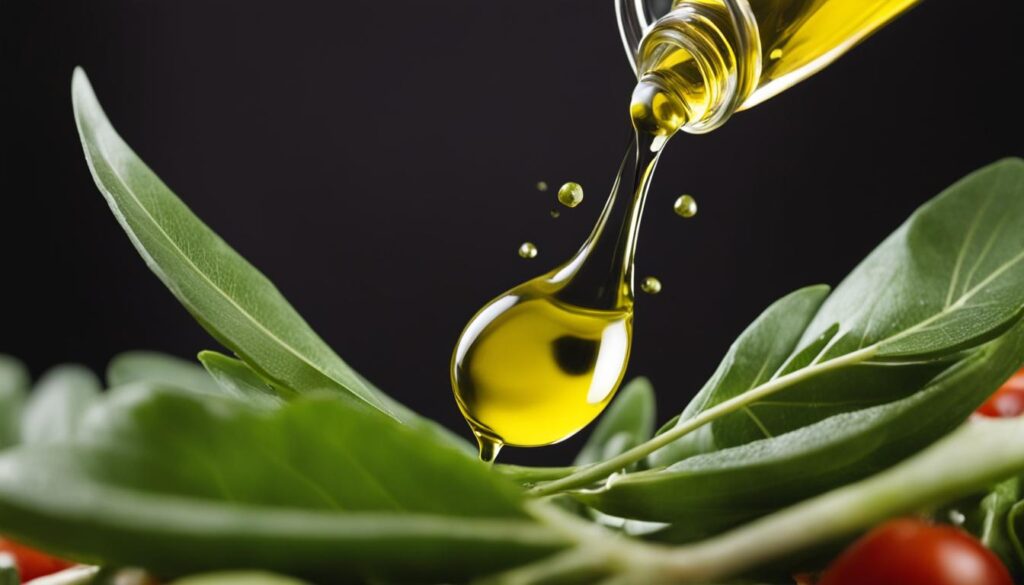
Olive oil consumption offers a wide range of health benefits that promote overall well-being. Scientific research has shown that incorporating olive oil into your diet can reduce the risk of various chronic diseases and improve overall health. Here are the key health benefits of olive oil:
1. Reduces the Risk of Heart Disease
Olive oil is rich in monounsaturated fats, which are heart-healthy fats that can help lower bad cholesterol levels and reduce the risk of heart disease. Studies have shown that a Mediterranean diet rich in olive oil can significantly decrease the risk of heart attacks and strokes.
2. Protects Against Stroke
The anti-inflammatory properties of olive oil contribute to its protective effects against strokes. Regular consumption of olive oil has been associated with a lower risk of stroke and improved brain function due to its ability to reduce inflammation and improve blood flow.
3. Manages Type 2 Diabetes
Olive oil has been found to be beneficial in managing type 2 diabetes. The monounsaturated fats in olive oil help stabilize blood sugar levels and improve insulin sensitivity. Incorporating olive oil into a balanced diet can help individuals with diabetes control their blood sugar levels more effectively.
4. Fights Inflammation
Olive oil contains powerful antioxidants and anti-inflammatory compounds that help reduce inflammation in the body. Chronic inflammation is associated with various diseases, such as cancer, heart disease, and arthritis. Regular consumption of olive oil can help alleviate inflammation and support overall health.
5. Protects Against Chronic Diseases
The antioxidants found in olive oil, such as polyphenols and vitamin E, play a crucial role in protecting against chronic diseases. These antioxidants neutralize harmful free radicals in the body, reducing oxidative stress and the risk of diseases like cancer and Alzheimer’s disease.
By enjoying the health benefits of olive oil, you can improve your overall health and well-being. Incorporate olive oil into your daily diet and experience the positive impact it can have on your health.
| Health Benefit | Description |
|---|---|
| Reduces the Risk of Heart Disease | Olive oil’s monounsaturated fats can lower bad cholesterol levels and decrease the risk of heart attacks and strokes. |
| Protects Against Stroke | Olive oil’s anti-inflammatory properties contribute to its protective effects against strokes by reducing inflammation and improving blood flow. |
| Manages Type 2 Diabetes | Olive oil helps stabilize blood sugar levels and improve insulin sensitivity, making it beneficial for individuals with type 2 diabetes. |
| Fights Inflammation | Olive oil’s antioxidants and anti-inflammatory compounds help reduce inflammation in the body, which is associated with various diseases. |
| Protects Against Chronic Diseases | Olive oil’s antioxidants neutralize free radicals, reducing oxidative stress and the risk of chronic diseases like cancer and Alzheimer’s disease. |
Household Uses of Olive Oil

While olive oil is widely known for its culinary and beauty applications, it also offers a range of practical uses around the house. From moisturizing the face to promoting weight loss and serving as a versatile lubricant, olive oil is a natural and chemical-free alternative for various household needs. Additionally, it can be used to polish wood furniture and condition leather, making it a versatile and eco-friendly option for everyday tasks.
1. Olive Oil for Face
Olive oil is a nourishing and hydrating moisturizer for the face. Its rich content of antioxidants and healthy fats can help replenish dry skin, leaving it soft, smooth, and radiant. Simply apply a small amount of olive oil to clean skin, gently massaging it in circular motions. Leave it on for a few minutes before rinsing with warm water. Incorporating olive oil into your skincare routine can help maintain a healthy complexion.
2. Olive Oil for Weight Loss
Contrary to popular belief, consuming olive oil can aid in weight loss when consumed in moderation as part of a balanced diet. The monounsaturated fats in olive oil help promote feelings of fullness and satisfaction, reducing the likelihood of overeating. Including olive oil in your meals can provide a delicious and nutritious option to support your weight loss goals.
3. Other Topical Uses
In addition to its benefits for the face and weight loss, olive oil can also be used for various other topical applications:
- Makeup Remover: Olive oil effectively removes makeup, including stubborn products like mascara and waterproof eyeliner. Simply apply a small amount of olive oil to a cotton pad and gently wipe away the makeup. Rinse with water and follow with your regular cleansing routine.
- Natural Lubricant: Olive oil can serve as a natural and safe lubricant for various household needs. Whether you’re dealing with a squeaky door hinge or a stubborn zipper, a light coating of olive oil can help alleviate friction and ensure smooth operation.
- Wood Polish: Olive oil can be used to revitalize and restore the luster of wood furniture. Mix equal parts olive oil and lemon juice, apply the mixture to a soft cloth, and gently rub it into the wood in circular motions. Wipe off any excess oil for a beautiful, natural shine.
- Leather Conditioner: Olive oil can help condition and soften leather items, such as shoes, bags, and furniture. Apply a small amount of olive oil to a soft cloth and gently massage it into the leather. Allow it to sit for a few minutes before wiping off any excess oil.
By harnessing the power of olive oil, you can discover a range of practical uses that extend beyond the kitchen and bathroom. Its natural properties make it a versatile and eco-friendly option for everyday tasks, providing numerous benefits for both your household and the environment.
| Household Use | Instructions |
|---|---|
| Face Moisturizer | Gently massage a small amount of olive oil onto clean skin. Leave it on for a few minutes before rinsing with warm water. |
| Weight Loss Aid | Incorporate olive oil into your meals as a healthy fat to promote feelings of fullness and satisfaction. |
| Makeup Remover | Apply olive oil to a cotton pad and gently wipe away makeup. Rinse with water and follow with your regular cleansing routine. |
| Natural Lubricant | Use a small amount of olive oil to alleviate friction on squeaky door hinges or stubborn zippers. |
| Wood Polish | Mix equal parts olive oil and lemon juice, apply to a soft cloth, and gently rub into wood for a natural shine. |
| Leather Conditioner | Massage olive oil into leather items and allow it to sit for a few minutes before wiping off any excess oil. |
Best Quality Selection and Storage
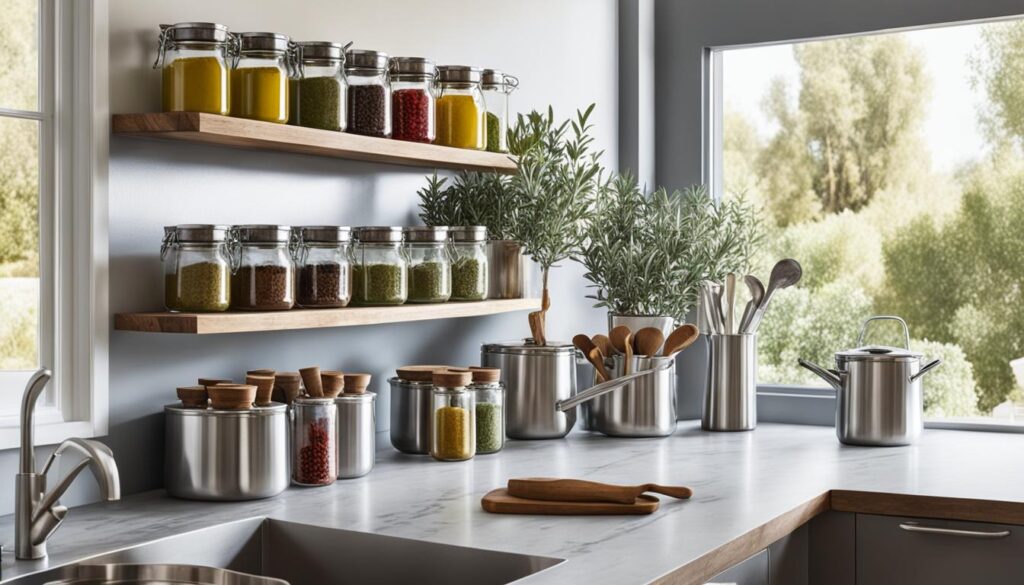
When it comes to olive oil, choosing the best quality option is crucial to ensure you’re getting all the health benefits it has to offer. Extra virgin olive oil is considered the highest quality olive oil available, known for its superior taste and maximum nutritional value. This type of olive oil is obtained directly from olives through a cold-pressing process, without the use of chemicals or excessive heat. As a result, it retains more of the natural antioxidants and nutrients that make olive oil so beneficial for our health.
When shopping for olive oil, look for reputable brands that are known for their commitment to quality. These brands often prioritize the use of high-quality olives and adhere to strict production standards. Additionally, check the labeling for important information such as the olive oil’s country of origin and whether it is certified as extra virgin. This will help ensure that you’re purchasing a trustworthy product.
Proper storage is also essential to maintain the quality of olive oil over time. Exposure to heat, air, and light can cause the oil to deteriorate and lose its flavor and nutritional properties. To preserve the freshness of your olive oil, store it in a cool, dark place, such as a pantry or cabinet, away from direct sunlight and sources of heat. This will help prevent oxidation and extend the shelf life of your oil.
Here are a few tips for optimal olive oil storage:
- Choose a glass bottle or dark-colored container to protect the oil from light.
- Avoid storing olive oil near stovetops, ovens, or other heat sources.
- Keep the bottle tightly sealed to minimize exposure to air.
- Do not store olive oil in the refrigerator, as the cold temperature can cause the oil to solidify and lose its flavor.
By selecting the best quality olive oil and storing it properly, you can ensure that you’re enjoying the full richness and health benefits of this liquid gold. Whether you’re using it for cooking, skincare, or other household purposes, high-quality olive oil is a versatile and nutritious choice.
History and Origin of Olive Oil

Olive oil has a rich history that spans thousands of years, with its origins rooted in the Mediterranean region. Ancient civilizations such as Greece and Rome cultivated and harvested olive trees for their precious oil, recognizing its valuable properties and numerous uses. The Mediterranean has long been known as a prominent region for the production of olive oil, with its ideal climate and fertile lands contributing to the cultivation of high-quality olives.
The production and consumption of olive oil spread beyond the Mediterranean, as trade routes and exploration introduced this valuable commodity to various parts of the world. Today, olive oil is produced in countries across the globe, each with its unique flavors and characteristics. However, the Mediterranean region remains a significant player in the olive oil industry, renowned for its traditional methods and exceptional quality.
Exploring the history and origin of olive oil provides valuable insights into its significance and cultural heritage. It allows us to appreciate the centuries of knowledge and craftsmanship that have shaped this prized oil into the versatile and essential ingredient it is today.
The Ancient Roots of Olive Oil
“Olive oil is the quintessential ingredient in Mediterranean cooking. Its history dates back thousands of years, and it has played a pivotal role in the culinary traditions of civilizations such as Ancient Greece and Rome.” – Celebrity Chef Maria Rodriguez
Since ancient times, olive oil has been cherished for its nourishing properties and diverse applications. It served as a staple in Greek and Roman diets and was highly valued for both its culinary and medicinal purposes. The rich cultural history surrounding olive oil is reflected in its continued significance, as it remains a fundamental component of Mediterranean cuisine and a symbol of the region’s heritage.
The Spread of Olive Oil Across the Globe
As seafaring civilizations expanded their trade networks, olive oil reached new lands and became sought after around the world. Its versatility and health benefits made it an attractive commodity, influencing the cuisines and cultures of various regions. Olive oil became an essential ingredient in European, Middle Eastern, and North African cuisines and continues to be celebrated for its distinctive flavors and positive impact on health.
| Region | Distinct Characteristics |
|---|---|
| Italy | Renowned for its diverse flavor profiles, including fruity, grassy, and peppery notes. |
| Spain | Produces a wide range of olive oils, from mild and buttery to bold and robust. |
| Greece | Known for its high-quality extra virgin olive oil with a distinct fruity taste. |
| Tunisia | Delivers olive oils with a delicate and floral flavor, often used in Mediterranean cuisine. |
The global production of olive oil continues to evolve, with new markets and innovative techniques emerging. Despite these changes, the reverence for the history and origin of olive oil remains steadfast, reminding us of its significant role in our culinary and cultural heritage.
Properties and Key Components of Olive Oil
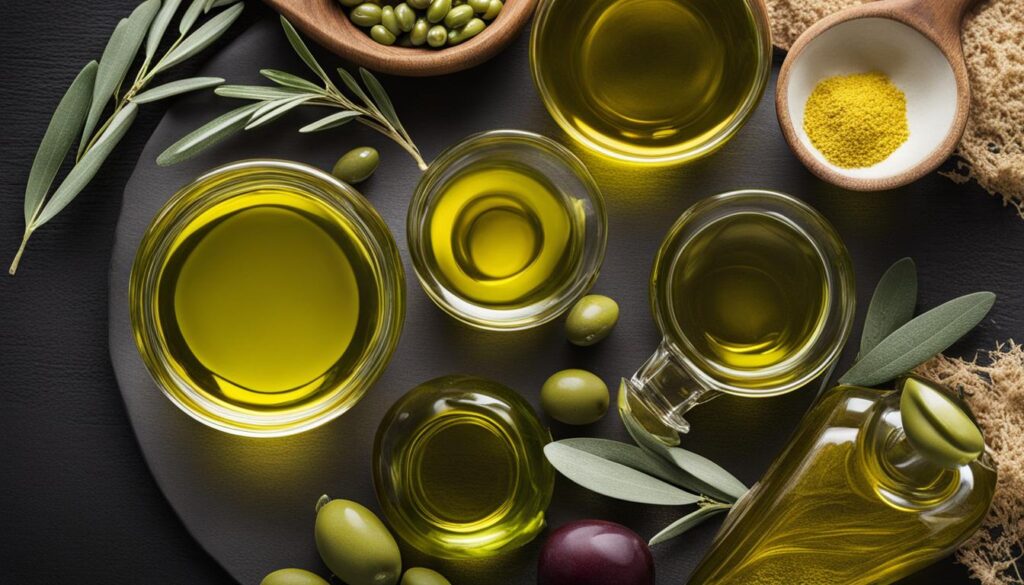
Olive oil is a versatile and nutritious oil that offers numerous health benefits. Understanding its properties and key components can help you make informed choices when selecting olive oil for your culinary and health needs.
Composition of Olive Oil
Olive oil is primarily composed of monounsaturated fats, making up approximately 73% of its total fat content. The predominant monounsaturated fatty acid in olive oil is oleic acid, accounting for about 55-83% of its total fatty acid composition. This type of fat is considered heart-healthy and has been associated with various health benefits.
The remaining fatty acid composition of olive oil includes saturated fats, such as palmitic acid (7-20%) and stearic acid (0.5-5%). These saturated fats should be consumed in moderation as part of a balanced diet. Olive oil also contains a small amount of polyunsaturated fats, including linoleic acid (3.5-21%) and alpha-linolenic acid (0.1-1.2%), which are essential fatty acids needed for proper body functioning (“First source:”).
Antioxidant Content
In addition to its fatty acid profile, olive oil is rich in antioxidants, including polyphenols and vitamin E. Polyphenols are plant compounds known for their antioxidant and anti-inflammatory properties. They contribute to the unique flavors, aromas, and colors of different types of olive oil.
Vitamin E, a fat-soluble vitamin, acts as an antioxidant in the body and helps protect cells from oxidative damage. Olive oil is a natural source of vitamin E, with extra virgin olive oil having higher levels compared to other types of olive oil (“First source:”).
Varied Types and Quality
The type and quality of olive oil can vary based on several factors, including acidity levels and extraction methods. The International Olive Council (IOC) has classified olive oil into several categories:
- Extra virgin olive oil: Considered the highest quality and least processed olive oil, it is obtained solely by mechanical means and has a free acidity level of less than 0.8%. Extra virgin olive oil retains the natural aroma, flavor, and nutrients of olives.
- Virgin olive oil: Also obtained solely by mechanical means, but with a slightly higher acidity level of up to 2%, virgin olive oil has a milder flavor compared to extra virgin olive oil.
- Refined olive oil: Produced by refining virgin olive oils, refined olive oil has a free acidity level of less than 0.3% and a milder taste. It is typically blended with virgin or extra virgin olive oil for improved flavor.
- Other olive oil categories: These include olive pomace oil, which is extracted using solvents from the olive pulp residue, and olive oil blends that combine refined olive oil with virgin or extra virgin olive oil.
When selecting olive oil, it is recommended to choose extra virgin olive oil for its superior quality and health benefits. Look for reputable brands and check the labeling to ensure authenticity (“First source:”, “Second source:”).
Table: Types of Olive Oil and Their Characteristics
| Type of Olive Oil | Acidity Level | Extraction Method | Taste | Recommended Use |
|---|---|---|---|---|
| Extra Virgin Olive Oil | Less than 0.8% | Mechanical | Distinctive, fruity | Drizzling, dressings, dips |
| Virgin Olive Oil | Up to 2% | Mechanical | Milder than extra virgin | Cooking, baking |
| Refined Olive Oil | Less than 0.3% | Refining process | Mild | Cooking, frying |
| Olive Pomace Oil | Up to 1% | Solvent extraction | Mild | Cooking, frying |
Usage Tips and Cautions
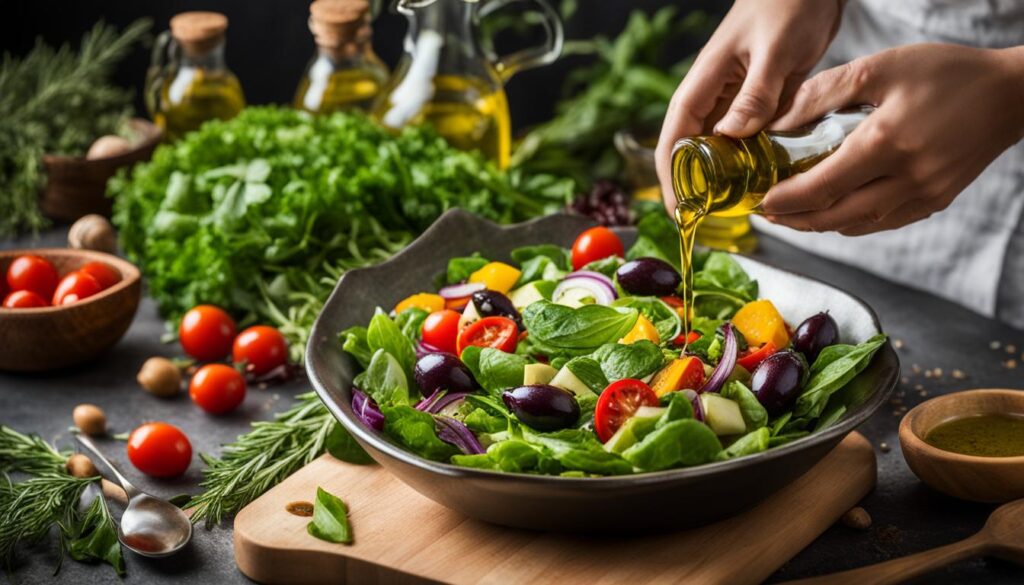
When it comes to incorporating olive oil into your diet, a few usage tips and cautions can help you maximize its benefits and minimize any potential risks. Here are some important considerations:
1. Moderate Consumption
While olive oil is a healthy choice, it is still high in calories. To maintain a balanced diet, it’s important to use it in moderation. Incorporate olive oil into your meals mindfully and be conscious of portion sizes.
2. Allergic Reactions
Although rare, some individuals may have allergies or sensitivities to olive oil. If you experience any adverse reactions, such as itching, swelling, or difficulty breathing after consuming or using olive oil, seek medical attention immediately.
3. Consult a Healthcare Professional
If you have specific health concerns, it’s always wise to consult with a healthcare professional before making significant changes to your diet. They can provide personalized advice and guidance based on your individual needs and circumstances.
“It’s important to use olive oil in moderation and be mindful of portion sizes to maintain a balanced diet.”
4. Storage and Shelf Life
To prolong the shelf life and preserve the quality of your olive oil, store it in a cool, dark place, away from heat and light. Avoid exposing it to air for extended periods, as oxygen can affect its flavor and nutritional properties.
By following these tips and exercising caution, you can enjoy the benefits of olive oil while ensuring its optimal use in your daily routine.
Other Topical Uses of Olive Oil
In addition to its culinary and beauty uses, olive oil has a multitude of other applications in our daily lives. Thanks to its natural properties, olive oil can be used as a remedy for dry skin, offering deep moisturization and hydration. Regularly applying olive oil on dry patches can help restore skin’s moisture balance and alleviate discomfort.
Moreover, olive oil serves as an excellent treatment for cuticles, keeping them soft and healthy. Simply massage a small amount of olive oil onto your cuticles before bed and wake up to nourished and revitalized cuticles. Additionally, with its rich emollient properties, olive oil can be used as a lip balm to soothe and protect dry, chapped lips.
Aside from its beauty benefits, olive oil can also be a valuable household tool. When it comes to removing sticky residue from surfaces, such as labels or adhesive, olive oil works wonders. Its gentle yet effective nature helps dissolve sticky substances without causing damage. Furthermore, olive oil can be used to polish and nourish wooden furniture, revealing its natural beauty and extending its lifespan.
Another surprising use for olive oil is as a natural lubricant. It can be used for household tasks that require lubrication, such as squeaky hinges or stuck zippers. With its smooth and non-toxic formulation, olive oil offers an eco-friendly alternative to conventional lubricants.
FAQ
What are the uses and benefits of olive oil?
Olive oil has a wide range of uses and benefits. It can be used for cooking, as a natural beauty remedy, and even for household purposes. Olive oil offers numerous health benefits due to its high content of healthy monounsaturated fats, antioxidants, and anti-inflammatory properties. Scientific research supports its positive effects on various aspects of health, including heart health, inflammation reduction, stroke prevention, and diabetes risk reduction.
How can I use olive oil for cooking?
Olive oil is a versatile and healthy choice for cooking. Its high monounsaturated fat content and resistance to high heat make it suitable for sautéing, frying, and baking. Olive oil adds a rich flavor to dishes while providing health benefits. It is recommended to use olive oil in moderation as part of a balanced diet.
How can I use olive oil for skin and hair?
Olive oil has been used for centuries as a natural beauty remedy. Its moisturizing properties make it beneficial for hair and skin care. You can use olive oil as a deep conditioner for hair, a moisturizer for dry skin, and an ingredient in homemade beauty products.
What are the health benefits of olive oil?
Olive oil consumption has been linked to various health benefits, including reducing the risk of heart disease, stroke, and type 2 diabetes. It has anti-inflammatory effects and contains antioxidants that protect against chronic diseases. Incorporating olive oil into your diet can promote overall health and well-being.
What other household uses does olive oil have?
Olive oil has a range of household uses beyond cooking and beauty. It can be used as a natural and chemical-free alternative for moisturizing the face, removing makeup, and promoting weight loss. Additionally, olive oil can be used as a lubricant, wood polish, and leather conditioner.
How do I choose the best quality olive oil and store it properly?
When purchasing olive oil, it is important to choose high-quality options, such as extra virgin olive oil, which retains more nutrients and antioxidants. Look for reputable brands and check the labeling for authenticity. To maximize its shelf life and preserve its quality, store olive oil in a cool, dark place away from heat and light.
What is the history and origin of olive oil?
Olive oil has a long history that dates back thousands of years to civilizations such as Ancient Greece and Rome. It originated in the Mediterranean region, where olive trees were cultivated and harvested for their oil. Today, olive oil is produced in various countries around the world, with the Mediterranean still being a prominent region for its production.
What are the properties and key components of olive oil?
Olive oil is primarily composed of monounsaturated fats, with oleic acid being the predominant fatty acid. It also contains antioxidants, such as polyphenols and vitamin E, which contribute to its health benefits. The type and quality of olive oil can vary based on factors such as acidity levels and extraction methods.
What are some usage tips and cautions for using olive oil?
When using olive oil, it is recommended to use it in moderation as part of a balanced diet. While it is a healthy choice, it is still high in calories, so portion control is important. It is also important to be aware of the potential for allergic reactions and to consult with a healthcare professional if you have specific health concerns.
What are some other topical uses of olive oil?
In addition to its culinary and beauty uses, olive oil has a range of other topical applications. It can be used as a natural remedy for dry skin, cuticle treatment, and lip balm. It is also effective for removing sticky residue, polishing furniture, and even as a natural lubricant.
